Inside Cycling with John Wilcockson: Time trialists take center stage
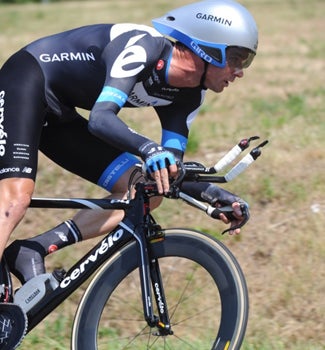
Wiggins, Millar break through, Zabriskie on a roll
Editor’s note: Every week through the 2011 road season, VeloNews Editor-at-Large John Wilcockson is writing about key features of the week’s racing. This is the 16th installment.
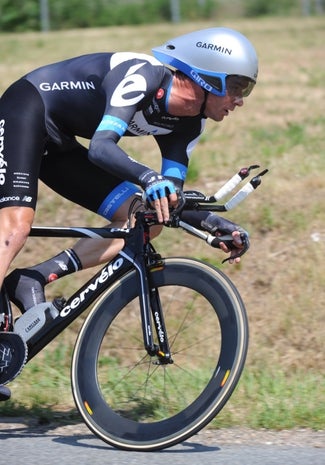
There’s perhaps no better indication of an athlete’s strength and form than time-trial performances. There were three major TTs this past weekend, and they were all won by riders from teams in the Anglo Empire: Brad Wiggins of Team Sky at Germany’s Tour of Bavaria; David Millar of Garmin-Cervélo at the Giro d’Italia; and Dave Zabriskie, also of Garmin, at the U.S. national TT championship.
Wiggins hadn’t won an international TT since taking the Giro prologue in the Netherlands more than a year ago. He was close to winning earlier this year in TTs at Paris-Nice (second to Tony Martin of HTC-Highroad), the Critérium International (second to Andreas Klöden of RadioShack) and the Tour de Romandie (fourth behind Zabriskie), but the lanky Brit was lacking the spark that earned him a succession of world and Olympic gold medals on the track and took him to fourth overall at the 2009 Tour de France.
After that fourth-place performance in Switzerland in late-May, Wiggins turned things around with a high-altitude training camp on Mount Teide in the Canary Islands; and he then tested his legs in England’s national 10-mile TT championship — winning the title at 50 kph by 41 seconds over the six-time defending champion Michael Hutchinson.
A week later in Bavaria, Wiggins averaged almost 52 kph to defeat world and Olympic TT champ Fabian Cancellara of Leopard-Trek by 32 seconds on a rolling 26km circuit at Friedberg. It was a great morale booster for Sky, whose British road champ Geraint Thomas took the GC victory, a month before heading to the Tour — where Wiggins will be a dark horse for a top-five finish.
2011 wins for UCI ProTeams
(in UCI .1 races and higher through May 29)
1. HTC-Highroad 23 (eight riders)
2. Team RadioShack 15 (nine riders)
Garmin-Cervélo 15 (nine riders)
4. Lampre-ISD 15 (seven riders)
5. Omega Pharma-Lotto 15 (three riders)
6. Movistar 14 (seven riders)
7. Rabobank 14 (six riders)
8. Saxo Bank-SunGard 13 (four riders)
9. Sky 12 (six riders)
10. Vacansoleil-DCM 12 (five riders)
11. Liquigas-Cannondale 10 (five riders)
12. Leopard-Trek 8 (four riders)
13. Euskaltel-Euskadi 6 (four riders)
14. Astana 5 (four riders)
15. Katusha 4 (three riders)
16. AG2R-La Mondiale 3 (three riders)
17. Quick Step 3 (two riders)
18. BMC Racing 3 (one rider)
Garmin can also feel satisfied after the new TT wins by Millar and Zabriskie, who will boost the American team’s chances in the stage 2 team time trial at the Tour de France, in which Ryder Hesjedal and Christian Vander Velde are its GC leaders. Millar showed he’d paced himself well over the three-week Giro to win the completely flat 26km TT finale in Milan at almost 52kph, beating HTC-Highroad specialist Alex Rasmussen by seven seconds, with overall winner Alberto Contador of Saxo Bank-SunGard 36 seconds back in third.
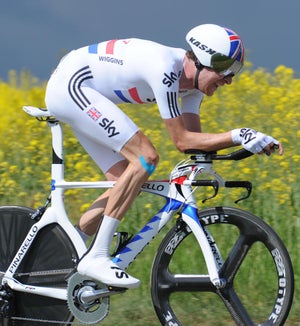
As for Zabriskie, he took his sixth national TT title in eight years, riding the technical, three-lap 33.3km course in Greenville, South Carolina, at 49.5 kph, to beat comeback man Tom Zirbel of Jamis-Sutter Home by 31 seconds. Zabriskie’s win wasn’t a surprise considering he’d won his two previous TTs against much tougher opposition, at the Tour de Romandie and Amgen Tour of California.
DZ’s California win
I first wrote the following story on the day of California’s Solvang time trial; but it somehow disappeared into a digital black hole and never appeared on the website. It’s a story worth telling (re-telling?) because it involved not only stage winner Zabriskie, but also a recuperating Levi Leipheimer of Team RadioShack, who looks he’s like hitting peak form for July’s Tour. Here is the analysis of that California TT:
SOLVANG, Calif. (VN) — Just after he finished the stage 6 time trial at the 6th Amgen Tour of California, Dave Zabriskie was under-whelmed by his time of 30:35 for the 15-mile (24.1km) course at Solvang, even though he had just improved the course record set by Leipheimer in 2009.
Asked by VeloNews if he felt that his performance would give him another TT victory like the prestigious one he scored in Switzerland’s Tour de Romandie a few weeks ago, Zabriskie said, “Don’t make any assumptions until it’s over. I tried hard, and I don’t think I could have gone any faster. I stopped pedaling a couple of times just to get a recovery but that was on a downhill, and I think that’s my style. I think I needed to do that….”
Then, before continuing, the enigmatic Garmin-Cervélo rider made one of his bizarre utterances: “Ow-ow-ow-ow-ow. I can’t think, man.”
It was clear that Zabriskie’s time trial was special, confirming his Romandie win, where he unveiled a drastically altered position: He raised his seat by 2cm, moving it back as far as it would go, and moved his aero extensions out by 2cm. But would his time at Solvang be good enough to defeat stage favorite Leipheimer?
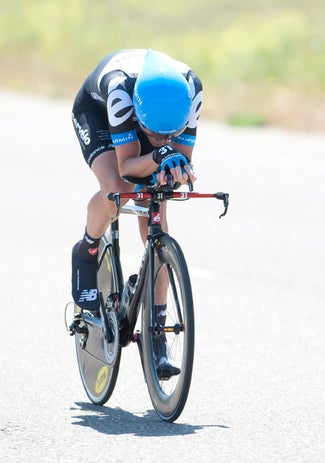
Zabriskie had to wait 35 minutes for the arrival of the man who had won all three of the Solvang TT stages when the Tour of California was held in February. Garmin’s five-time national TT champ feared the worst when Leipheimer went through the time split atop Ballard Canyon climb, 6.1 miles (10km) from the finish, more than one second faster.
But when Leipheimer hit the finish line in 30:49, having conceded 15 seconds to Zabriskie in the final 10km, he knew the win was his.
As for Leipheimer, he said he was puzzled by losing a quarter-minute in 10 mostly downhill kilometers. “I can’t believe it, you know,” he told VeloNews. “I mean, I thought I stepped on the gas a little bit; at the same time, I felt a little bit uncomfortable on the way back.”
Maybe the answer to the time-loss was the 40-kph wind gusts that swept through the Santa Ynez Valley vineyards on a bright Friday afternoon. The wind direction slightly changed at the end of the day, according to eventual third-place finisher Tejay van Garderen, who raced 15 minutes behind Zabriskie.
“It was like a head wind all the way,” the HTC-Highroad youngster said. “I expected a tailwind coming down the hills … and then I got hit with a head wind on the way back.”
An analysis of the last few starters’ times compared with those of the final few riders seems to confirm van Garderen’s anecdotal observation. For instance, van Garderen took 11:44 to ride the final 10km, while Rabobank’s Maarten Tjallingii, a less-talented time trialist who rode 48 minutes earlier, did that last stretch in 11:31 — 13 seconds faster.
Zabriskie averaged 53.651 kph for the final 10km, a speed that seems to conform that he didn’t have to contend with a head wind. But Leipheimer was gracious in defeat. “I’m sure I was the fastest on the hills because I saved it for all the important parts; that’s how it is. And I think if you look at the times I went really fast … he just went super-fast. I think I was taking advantage of some downhills to rest, and that was probably where he stayed on the gas.”
As for Zabriskie taking his course record, Leipheimer said, “I think that’s apples and oranges, you know: February to May. Today, you had new pavement, more favorable winds (at the start), and it was a little warmer. So you can’t really compare. Certainly, we all go faster in May than February.”
So, twice in three days, Leipheimer, the three-time California winner, came up short. Asked if he was disappointed with his fourth-place finish on stage 4’s Sierra Road finish, more than a minute behind teammate Chris Horner, he said, “Absolutely. I was really personally disappointed. I think that’s fair to be disappointed, you know. But if I can’t win, guess who’s the next person I’d like to win? And that’s Chris.”
“It’s very important that we win this race,” he added. “It’s big for our sponsor, it’s big for our team. It’s an important time for us, and the most important thing is, we win the whole race — even if it means sacrificing second on the podium or a stage win. That’s the main goal.”
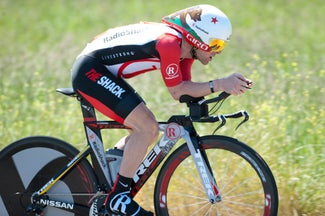
Despite going into the Mount Baldy stage with a 38-second deficit on teammate Chris Horner, Leipheimer was pleased to be feeling better. “You know, it’s been a tough year,” he said, referring to the intestinal semi-obstruction, a recurrence of an old stomach injury, that caused him to abandon the Volta a Catalunya on March 26. “I’m actually really proud of the comeback I’ve made, to get to this point.
“You know, being in the hospital twice this year has been tough. I shouldn’t say that, because I hate making excuses. I’m just proud of the fact that I’ve come back. I’m happy to say I’m in good form here. Five weeks ago I was crap.”
As for Zabriskie, who lost four minutes on the Sierra Road summit finish, he said, “I didn’t really know what to expect coming into this race, especially that (Sierra Road) stage and the Baldy stage. I guess that stage kind of showed I just didn’t have it. I’ve never been a strong uphill finisher.”
But by losing time on Sierra, Zabriskie started earlier in the Solvang TT — and that, in the end, proved to be to his advantage.
Upcoming time trials
Time trials will play a big role in the next big races on the international calendar. The first is the Critérium du Dauphiné, June 5-12, which features both a prologue and a regular TT at Grenoble (on the same course as will be used at this year’s Tour de France), and which will feature such strong TT specialists as Wiggins, Zabriskie, Martin, Cadel Evans of BMC Racing, Jani Brajkovic of Team RadioShack and Alexander Vinokourov of Team Astana. Later in the month, the Tour of Switzerland, June 11-19, also features two TTs, and has such protagonists as Cancellara, Leipheimer, Klöden, Horner and van Garderen.